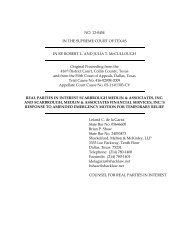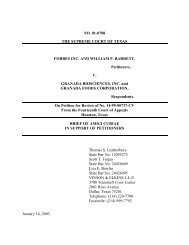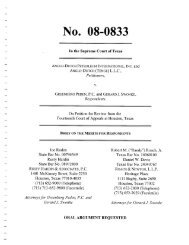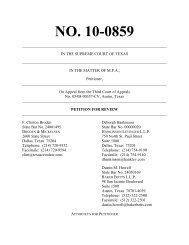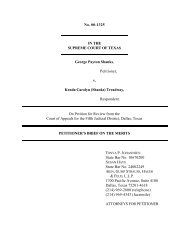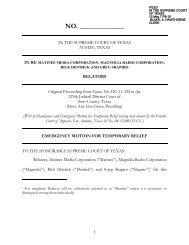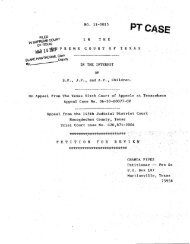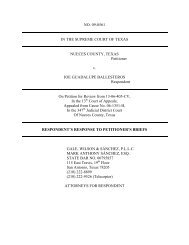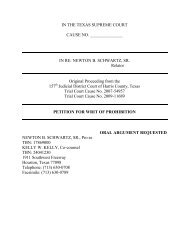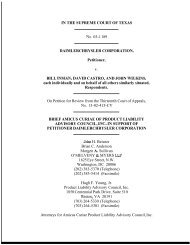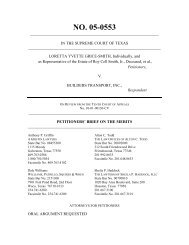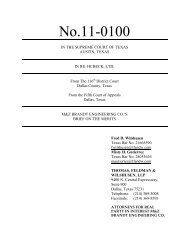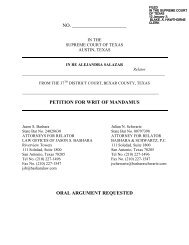Petition for Writ of Mandamus - Filed - Supreme Court of Texas
Petition for Writ of Mandamus - Filed - Supreme Court of Texas
Petition for Writ of Mandamus - Filed - Supreme Court of Texas
You also want an ePaper? Increase the reach of your titles
YUMPU automatically turns print PDFs into web optimized ePapers that Google loves.
<strong>Texas</strong> Comptroller <strong>of</strong> Public Accounts<br />
May 11, 2012<br />
Page 5<br />
The numerous disparities within the calculation <strong>of</strong> Margin lead to an arbitrary number,<br />
called Margin, which has no relation to the value <strong>of</strong> a taxpayer's Privilege. A taxpayer may have<br />
a tax base that is twice that <strong>of</strong> another taxpayer that receives the same Privilege due to a COGS<br />
deduction or compensation deduction that Is arbitrarily conferred on the latter. This disparate<br />
treatment <strong>of</strong> similarly-situated taxpayers does not end with the calculation <strong>of</strong> Margin, but Is<br />
compounded by the arbitrary application <strong>of</strong> tax rates.<br />
The Margin Tax imposes two tax rates on two classes <strong>of</strong> taxpayers — 0.5% to<br />
wholesalers and retailers and 1.0% to manufacturers. Id. § 171.002(a), (b). Whether or not a<br />
taxpayer is subject to the higher or lower tax rate depends on the taxpayer's activities<br />
throughout the United States, not just in <strong>Texas</strong>. Accordingly, a taxpayer such as Nestle who<br />
only wholesales in <strong>Texas</strong>, but manufactures in other states is treated differently than other<br />
taxpayers who only wholesale in <strong>Texas</strong>. These taxpayers enjoy the same Privilege in <strong>Texas</strong>,<br />
but the taxpayer who manufacturers elsewhere is subject to twice the tax rate. There is no<br />
rational basis related to the value <strong>of</strong> the Privilege <strong>for</strong> taxing these similarly-situated taxpayers<br />
differently.<br />
The Margin Tax violates the Equal Protection Clause on multiple levels by treating<br />
differently similarly-situated taxpayers in the calculation <strong>of</strong> the tax base and in the application <strong>of</strong><br />
the tax rate. These differences in treatment have no rational basis and are not fairly and<br />
substantially related to the taxation <strong>of</strong> the value <strong>of</strong> the privilege <strong>of</strong> doing business in <strong>Texas</strong>.<br />
Ill.<br />
The Margin Tax Violates the Due Process Clause <strong>of</strong> the United States Constitution.<br />
In the context <strong>of</strong> a state tax, the Due Process Clause <strong>of</strong> the U.S. Constitution "requires<br />
some definite link, some minimum connection, between a state and the person, property, or<br />
transaction it seeks to tax." Quill Corp. v. North Dakota, 504 U.S. 298, 312 (1992) (quoting<br />
Miller Bros. v. Maryland, 347 U.S. 340, 344-45 (1954)); see U.S. CONsT, Amend XIV, § 1. In the<br />
case <strong>of</strong> a tax on an activity, there must be a connection to the activity itself, rather than a<br />
connection only to the entity the State seeks to tax. Allied-Signal, Inc. v. Director, Div. <strong>of</strong><br />
Taxation, 504 U.S. 768 (1992). The test is whether the taxing power exerted by a state bears<br />
fiscal relation to protection, opportunities, and benefits given by the state. Wisconsin v. J.C.<br />
Penney Co., 311 U.S. 435, 444 (1940); Norfolk & W Ry. v, Mo. State Tax Comm'n, 390 U,S.<br />
317, 326 n.5 (1968). The simple but controlling question is whether the State has given<br />
anything <strong>for</strong> which It can ask a return, J.C. Penney, 311 U.S. at 444,<br />
The Margin Tax imposes a 0.5% tax on wholesalers and retailers and a 1.0% tax on<br />
manufacturers. Pursuant to the Due Process Clause, this significant difference in tax rate must<br />
be based on a difference in the protections, opportunities, and benefits conferred by <strong>Texas</strong> on<br />
the entities. In other words, manufacturers must receive greater benefits from <strong>Texas</strong> than<br />
wholesalers and retailers receive. This is not the case with entities, such as Nestle, that<br />
manufacture outside <strong>of</strong> <strong>Texas</strong>, but only wholesale and/or retail within <strong>Texas</strong>. Such entities do<br />
not receive any additional benefits from <strong>Texas</strong> with respect to their manufacturing operations.<br />
By taxing these entities based on activities <strong>for</strong> which <strong>Texas</strong> confers no benefit, the Margin Tax<br />
violates the Due Process Clause <strong>of</strong> the United States Constitution,<br />
AUSTIN I \661403 vl 52275-1



